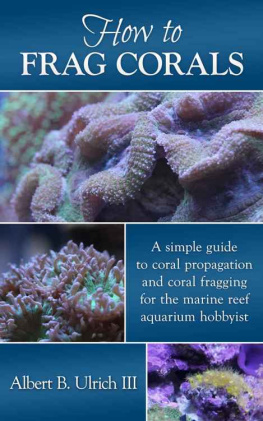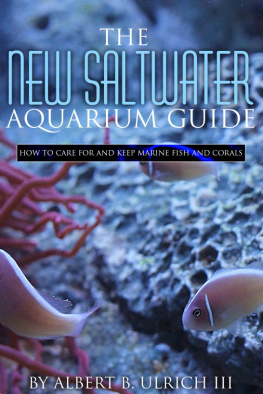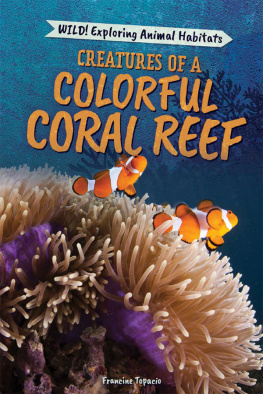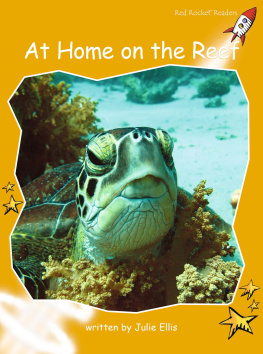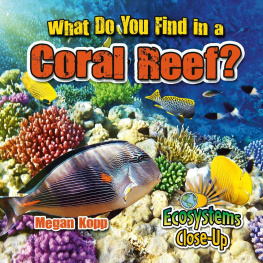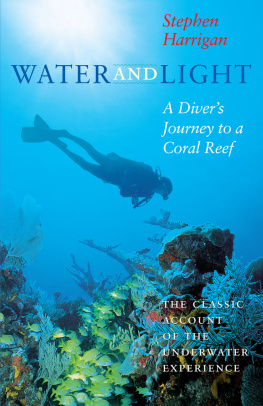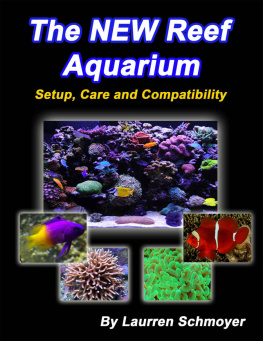As I get older, Ive noticed that it gets harder and harder to determine exactly where and when I learned something. Knowledge is a tricky thing, that way. As I mention, at length, in the Preface to this book, a key source of knowledge and information for me was Anthony Calfos book, Book of Coral Propagation. In addition to that, I also learned a lot by sifting through the tomes of advice on WetWebMedia.com and GARF.org . Please see the references at the end of the book for other great sources of information that either directly or indirectly connected a few neurons in my own head, some of which may have led to something I wrote here.
Preface
Ive heard (or read, I guess?) that successful authors give the following advice to other authors struggling to identify what to write next:
1) Write what you know.
2) Write the book you want to read.
3) Write the book your readers want to read.
Since I dont know much, and I dont know how to read, I left it up to you--the reader--to decide.
How did I know that this is the book you wanted to read? By some cosmic paradox, I know that this is the book you wanted to read, because youre reading it now. Not only that, but youre reading the Preface to the book, and only very motivated, very interested, good looking and brilliant people do that. Ok, Im pandering to you a bit, but seriously, I cant tell you the last time I read a preface. So by some weird e-book natural selection, we have determined that this is, in fact, a book you wanted to read. So thank you for that. I hope I dont let you down.
With those inane ramblings out of the way, let me give you the real story behind this book. The first aquarium I ever had was a 10-gallon tank for a turtle. I was very young at that point--probably 5 or 6 years old. Every few weeks, my parents would let me buy the turtle live feeder fish. I remember watching the turtle hunt the fish with my grandmother. Its funny that after all of these years, thats probably the most vivid memory I have of her. One time, we ended up buying a dozen guppies. The turtle made short work of 10 of the guppies, but two survived. At some point, they became background and were completely ignored by the turtle. Serendipitously, we ended up with a male and female and, guppies being guppies, they started cranking out baby guppies every month. That blew my little mind. I can remember that so clearly, and it made a strong imprint on my life. In some shape or form, I have been trying to recreate that aquarium full of guppies feeling in interesting and new ways throughout my life.
The feeling is one of creation, the miracle of life, even alchemy, and we are only able to observe it when the conditions are just rightconditions which we painstakingly create and maintain as aquarium hobbyists.
You may be wondering, what does THAT have to do with fragging corals? Ironically, I have no memory of how the guppy saga ended, but I vividly remember the dead turtle and throwing away the aquarium.
A few years later, I started over and bought another aquarium. This time, the aquarium was for fish, not reptiles. That first tank led to anotherand then anotherand then another. After several years in the freshwater side of the hobby, I switched over to saltwater tanks, which is where I have been ever sinceif you exclude the occasional Beta.
My three favorite saltwater aquarium books are: The Complete Illustrated Breeders Guide to Marine Aquarium Fish , Clownfishes , and Book of Coral Propagation . Do you see the aquarium full of guppies theme?
Book of Coral Propagation was the book that inspired me the most. I had read the seminal books on reef keeping, but quite honestly, I found the academic tone and classification-oriented texts to be important, but uninspiring. After reading Calfos book, I had an action plan and was inspired to do something different. Prior to that, I was going to be just a saltwater fish guy. I had my sights set on breeding Banggai Cardinalfish Neon Gobies and Clownfish (which I was able to do, eventually).
I was inspired and ready for action, after reading that book, but I still found myself struggling with fears. Is coral fragging unnatural? Is it safe? What equipment do I need? Do I need a frag tank? How can I be sure I wont damage the coral? Will I cause the entire tank to crash? What exactly are the steps I need to take?
I did more research online and offline and learned through trial-and-error. Along the way, I have had my own coral fragging successes and failures. My hope is that this book helps fill in a few of those knowledge gaps for you.
It would be brash to hope that this book will inspire you, but hopefully you will find a nugget or two in this book that helps you explore a side of the hobby you wouldnt have otherwise considered.
What is it that youre hoping to get out of this book? Send me a note now and let me know:
Or wait until youve read the book and tell me what (if anything) inspired you--or tell me what I could change to make it more inspiring.
In homage to the book that gave me the inspiration to explore an aspect of the hobby that was beyond my comfort zone, this is my attempt at helping you learn How to Frag Corals .
To Inspiration
Disclaimer about the Risk of Losses
I genuinely struggled with whether or not to post this note in the front of the book here, because I know that risk of loss and fear of not knowing what youre doing are probably the biggest things that have kept you from fragging your own corals. With the exception of this section, the rest of this book is written to help educate, inform, inspire and give you the confidence to frag your own corals like a pro. But I thought it would be disingenuous of me to write about the techniques and approaches to fragging your corals without providing fair and balanced information about the risks.
Corals can be exceedingly delicate creatures, at times. Seemingly minor changes in the environment can cause major damage to natural reefs. Other times, they seem nearly bullet-proof, or even down-right frustrating. Just try to rid yourself of zoanthids or mushrooms that you have grown tired of and are trying to remove from your tank. Sometimes it just cant be done.
Suffice it to say, any time you cut into a coral, even if you do everything right, you risk damaging or killing that coral.
This book is intended to help you understand the techniques commonly used to frag corals and help you build confidence to explore this aspect of the hobby. If you are absolutely intolerant of risk, if you cannot stand the thought of ever damaging a living creature, even if by accident, or otherwise cannot afford any losses, you probably should not try fragging corals. There is always risk involved.
The goal is to appropriately lower the risk, when possible, with education, planning and technique. Actively growing corals tend to respond pretty well to fragging. If you start your adventure by learning and practicing with some of the hardier species (note I wrote hard i ermeaning less prone to problems, not hardermore prone to problems), you are more likely to find success and you can gradually work your way up to a few of the more complicated species.

